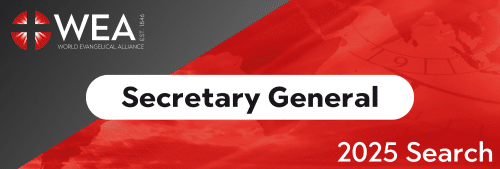In September, the WEA Sustainability Center released a probing series of studies entitled ‘The Bible and the SDGs’, containing devotionals and supportive content related to the 17 United Nations Sustainable Development Goals.
The studies include reflections on Christian responsibility in the 17 SDG areas, authored primarily by WEA Mission Commission director Jay Matenga. The messages, packed with numerous biblical references, are accompanied by examples of featured projects and suggestions for practical action.
The reflections urge Christians to engage collaboratively with others in pursuit of the common good while pointing to Jesus Christ as the ultimate source of peace and harmony. As Matenga writes in the message for goal 17 on partnerships, the SDGs ‘suggest a shalom-kingdom vision, while ignoring the King. What these secular aspirations see in part, we can see in full. Furthermore, we are empowered by the Spirit of God to achieve them. Followers of Jesus should therefore be leading the way in accomplishing these goals and lending our efforts to all those who share these aspirations.’
In a webinar on the project, Matenga explained, ‘I think one of the critical elements missing in evangelical understanding of creation care, and a reason why the West easily dismisses it, is that we lack a robust theology of immanence. The Enlightenment led to a separation of the material world from spiritual realities in evangelical thinking, and Western thinking still tends to resist full integration of the two. … If we can learn to perceive God’s immanence in the world and our connection with it, that will transform our understanding of creation care and our commitment to sustainability issues.’
The webinar also included an impressive presentation by Apostle Vincent Anane Denteh of the Ghana-based Church of Pentecost, describing that denomination’s use of the 17 SDGs to guide its commitment to holistic ministry. Denteh summarized Church of Pentecost projects responding to nearly every one of the SDGs. The projects include, amongst others, a microloan programme, sustainable agriculture development, construction of healthcare facilities, establishment of more than 90 schools, vocational training, safe water initiatives, and even building three correctional facilities to reduce prison overcrowding.
‘The Church of Pentecost has presented a model of how the SDG language can be translated into actual work’, Matenga commented. ‘Theologians and theorists can come up with reasons to do it, but unless you see it practiced well, it is hard to understand how it can be done.’
Joseph Wumbee of AG Care, the Assemblies of God relief arm in Ghana, described his organization’s outreach to young female victims of forced migration into Ghana’s cities. AG Care has rescued 1,500 girls from the streets into a nine-month skills training and counseling programme that rehabilitates the girls and reintegrates them into their original communities. AG Care has also developed 80 schools that have become part of Ghana’s national education system.
‘The Bible and the SDGs’ is available at https://wea-sc.org/en/biblesdgs.
The WEA has long been addressing sustainability issues, including the SDGs. Two prominent WEA-produced works on the topic are Ken Gnanakan, Responsible Stewardship of God’s Creation (2014; https://iirf.eu/journal-books/global-issues-series/responsible-stewardship-of-gods-creation/) and Thomas Schirrmacher and Thomas K. Johnson, Creation Care and Loving Our Neighbors (2016; https://iirf.eu/site/assets/files/105856/wea_gis_17-thschirrmacher_thkjohnson-environmental_ethics.pdf).]]>





Stay Connected